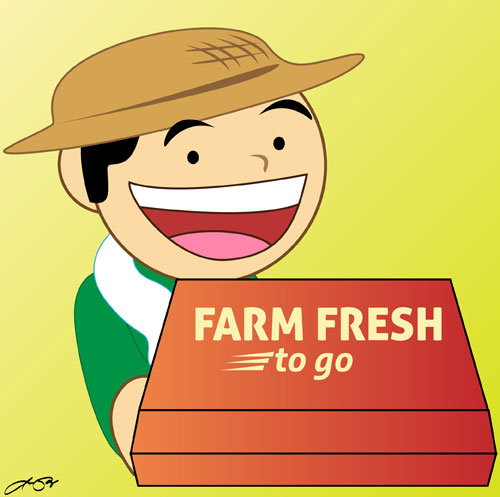LOS BAÑOS, Laguna – Farmers as entrepreneurs? One of the country’s biggest fast food companies believes this is possible, and has pledged to provide a ready market for agricultural produce from farmers’ groups. At a recent symposium organized by the International Rice Research Institute (IRRI), the chairman of Jollibee Foods Corporation (JFC) said the company is open to partnerships with farmers’ cooperatives that can supply its needs. “When it comes to agricultural products, about 80 per cent of our raw materials are sourced locally. For rice, it’s 100 per cent," said billionaire Tony Tan Caktiong, who spoke about the role of fast food companies in the agricultural sector at the forum last June 23.

Illustration by Analyn Perez
Although it works mostly with large-scale food suppliers, Jollibee has started procuring its agricultural needs from rural producers through its Farmer Entrepreneurship Program “JFC and the Jollibee Foundation are willing to partner with agricultural communities in developing farmers not just as productive tillers of their own land but also as entrepreneurs in their own right," Caktiong said. The program introduces effective farming technologies and methods to farmers, and aims to provide a stable source of income to small producers by linking them to institutional markets. “Once they are ready, we negotiate with them to become regular suppliers," Caktiong said. He cited as an example the Glory to God Forever Food Corporation, a cooperative that manages farmers’ group from various parts of the country. Since 2005, the cooperative has been supplying Jollibee with green bell pepper, red bell pepper, lettuce, tomato, potato, siling labuyo, and ube. “We all have a part to play as a producer, provider, and consumer of goods. For our part, we will focus on our core competencies by building a ready market for local agricultural products," Caktiong said. He expressed support for the goal of President Aquino’s administration to achieve rice self-sufficiency by 2013, even as researchers said the target date could be pushed back by four years due to a variety of factors.
Growing demand for rice In a study entitled “New rice technologies and challenges for food security in Asia and the Pacific," researchers M. Hossein and Josephine Narciso said several factors affect rice demand including population growth, discrepancies in income, urbanization, and scarcity of agricultural inputs. Dr. Sergio Francisco, Chief Science Research Specialist at PhilRice, said the Philippines is more likely to achieve rice self-sufficiency by 2017, four years after the target date, assuming a sustained natural growth in production of 3.68 per cent annually. Last year, four of Jollibee’s nine fast food chains ordered 20,000 tons of rice from the provinces of Nueva Ecija, Isabela, and Pangasinan. This volume of production requires about 2,800 hectares of farm land, or about the size of Metro Manila, Caktiong said. Flagship chain Jollibee alone accounts for sixty percent of the rice demand which consists of long-grained, premium, and grain-milled varieties, he added. JFC has more than 2,300 stores worldwide with an annual system-wide sale of P79.2 billion. Its eight other chains are Chowking, Greenwich, Red Ribbon, Caffe Ti-Amo, Mang Inasal, Yonghe King, Hong Zhuang Yan, and San Ping Wang. –
YA/OMG, GMA News 





